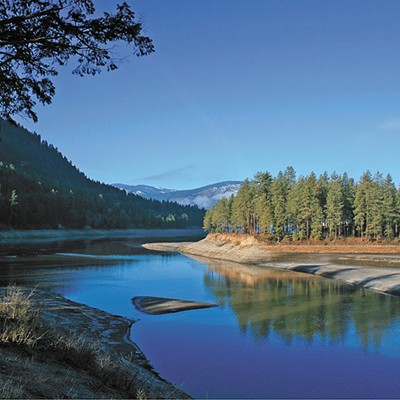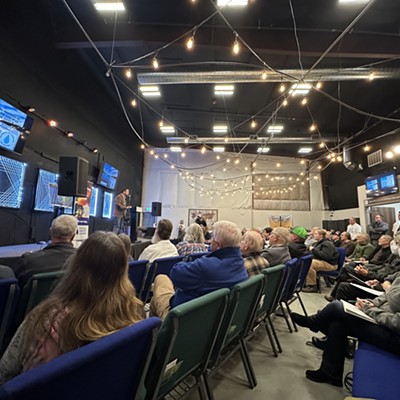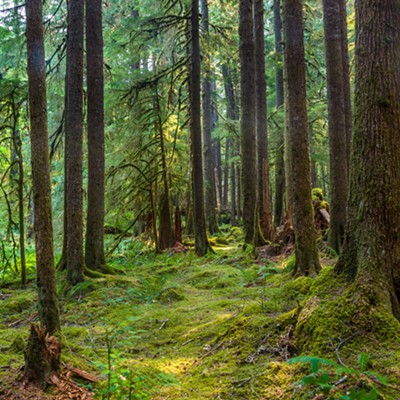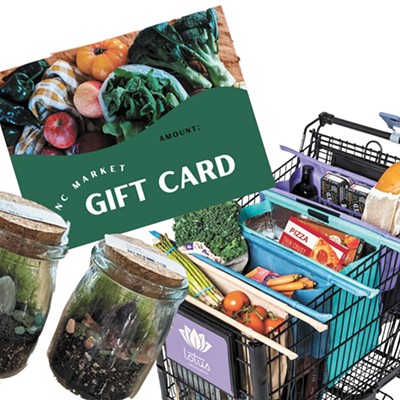Sam Mace admits being a bit cynical about Earth Day. But it’s not entirely surprising. She’s the Inland Northwest Project Director for Save Our Wild Salmon, a nationwide coalition of conservation organizations, commercial and sports fishing associations, businesses and river groups vested in the revitalization of self-sustaining populations of wild salmon and steelhead.
Their ultimate goal is to remove four dams on the lower Snake River — a move that they say will “restore the Pacific Northwest’s wild salmon and free-flowing rivers as vital economic engines for local communities” — but it hasn’t been an easy fight so far.
INLANDER: What does Earth Day mean to you?
MACE: I guess it’s a day for me to remember all the great work and great leaders in the ’60s and ’70s who started pushing awareness of environmental issues. In some years, like the ’80s, I’ve always gotten a little cynical about [Earth Day], watching some of the corporations try to take it on and make it their own, but I try to come back and remember how it got started and the individuals that made it happen.
How far have we come in the 40 years since the first Earth Day?
It’s a mixed bag. We’ve seen some great landmark laws from the Clean Water Act, the Endangered Species Act and the National Forest Management Act. We’ve done a lot to clean up waterways and address pollution. But when it comes to an issue near and dear to my heart — wild salmon — I find it disappointing that the Obama Administration is failing to follow what they pledged. They’re still upholding some of the poor science policies of the Bush administration.
How are you trying to impact the environment for the better, and how is the current administration making it difficult?
I have worked for the last 11 or 12 years on trying to return wild salmon and steelhead to the Columbia and Snake rivers. But unfortunately, the Obama Administration is upholding the policies of the Bush Administration when it comes to doing what we need to for our fish, and not spilling water from the dams — even though scientists are telling us we really need to do this. … For the past several years, a judge in Portland has upheld and ordered the federal agencies to spill that water in the spring and summer, but the Obama Administration put a request in front of the judge to not spill that water.
How does spilling help?
The water goes over the spillways, instead of through the turbines, so it creates more of a river-like environment. Spilling water equals higher returns.
Say the judge upholds the whole spilling thing. What hurdles come after this?
Our next goal is to look beyond the ongoing yearly battles of spilling water, and push our politicians like [Washington Senators Patty] Murray and [Maria] Cantwell to bring stakeholders together and figure out a long-term solution. Right now the commercial fishermen don’t have certainty, businesses that rely on sport fishing don’t have certainty, and farmers relying on the dams don’t have certainty.
What issues aren’t we addressing that we must?
We need to look at the whole — the long-term solutions. Not just some Band-Aid to get us through another salmon season. As someone who grew up in a timber/logging town [in Coos Bay, Oregon] and saw the direct connection of devastation between the environment and the local economy, we need to do a better job in recognizing the connection between a healthy environment and a healthy economy. And that’s not just a slogan. It’s a truth.
On Facebook you posted an update promising to be less cynical about Earth Day, then later added the comment, “My favorite part is when the big timber companies give out free tree seedlings. It’s so special. They are such givers!!! Thankfully I don’t think they are allowed at the Spokane Earth Day.” Care to elaborate?
As I said, I grew up in a western Oregon logging town. I can remember being in grade school and being sent out on these field trips to replant Georgia Pacific clear-cuts, and at the time feeling so good, like, ‘Oh, I’m doing something good.’ And then I stopped to think about where the clear-cut came from. It’s always stuck with me and irritated me when I’m at an Earth Day event and I’m right next to some timber company who’s giving out these tree seedlings. It just pushes a button with me.
Born out of the environmental movement of the late ’60s, Earth Day turns 40 this week. To mark the occasion, we decided to take stock of our successes and failures, asking local activists and thinkers to consider how far we’ve come and which issues need our attention now.





















